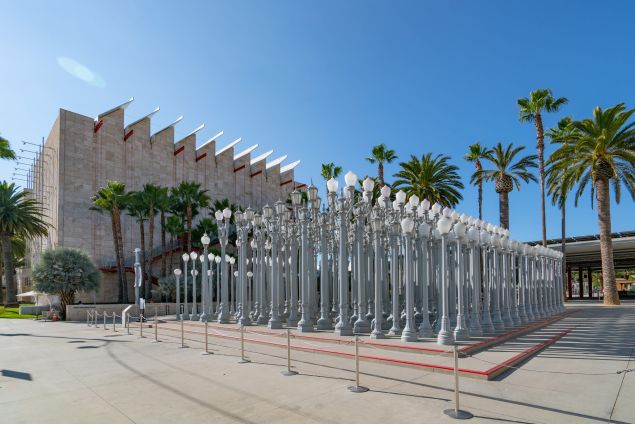LACMA on August 26, 2020 in Los Angeles, California. AaronP/Bauer-Griffin/GC Images
Across the country, museums have been shoring up their health and safety practices and introducing new technologies to their institutions in order to ensure visitors are safe during the pandemic. However, state-by-state, different categorizations determine when museums are allowed to reopen. In California, recent reports have revealed that only some of the state’s museums were allowed to reopen on June 12, and that on July 1, all these museums were ordered by Governor Gavin Newsom to shut down again. In comparison to a state like New York, which has gradually allowed museums to open at reduced capacity and remain open, California’s approach is quite strict.
As a result, California museum directors have begun to speak out against the state’s designation of museums, which they believe to be incorrect. According to California’s mandates, museums have been placed within the same risk category as movie theaters and indoor dining. In comparison, in California, businesses like shopping malls and retail locations have been permitted to reopen while many museums remain closed. In response, multiple California mayors have written a letter to the Governor imploring him to rethink the state’s museum designations. “Given the role that museums play in enriching the lives of visitors and helping to reflect our shared hopes and values, we urge you to align the classification of museums in the state’s current tiered color-coded classification system with the restrictions placed on retail and indoor malls,” the letter reads in part.
Subscribe to Observer’s Arts Newsletter
Celeste DeWald, the executive director for the California Association of Museums, expressed to USA Today that not all museums are exactly alike; therefore, they should not all be handled in terms of public health regulations in the same way. “We want to raise awareness that not all museums are major tourism destinations in urban environments,” DeWald said. “In a lot of cases, museums are doing really important work in smaller, rural or suburban communities, and even urban communities.” Indeed, as recent evidence has shown, museums have turned out to be crucial voting locations in the pandemic, in addition to cultural hubs and meeting sites for protests and demonstrations. If museums remain shut down forever, America will lose one of its most vital lifelines to humanity at large.









